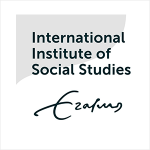The International Institute of Social Studies (ISS) in The Hague is a graduate institute of policy-oriented critical social science. Established by the Dutch Government in 1952, today it is part of the Erasmus University Rotterdam (EUR).
ISS is based in The Hague. It has around 62 academic staff and 280 full- time students. ISS staff members specialize in topics from land reform to enterprise development, and from the World Bank to slum politics, from human rights to genocide, and from inequality to social movements, from global migration to the role of media in conflict. In addition to its teaching and research, ISS is active in the fields of advisory work and institutional capacity building projects. All ISS activities are characterised by an interdisciplinary approach and are conducted by an international staff which reflects a broad range of experience and theoretical interests.
When the ISS was created, the idea was to train and bring to the Netherlands young, bright people, mainly government employees initially, from mainly post-colonial countries. This was one way in which the Netherlands sought to develop good relationships with intellectuals and policy makers in partner countries, including and beyond former Dutch colonies. More recently the profile of students who come to study for Masters and PhDs at the ISS has been changing. A greater proportion are from Europe and North America, and even from the Netherlands, as well as from Central Asia and former communist bloc countries, however, the majority are still from Asia, Africa and Latin America.
Key to the ISS philosophy and practice is the wish to make a contribution to achieving social justice and equity on a global level. The strong partnerships with organizations and individuals in developing countries make up a network in which the co-creation of knowledge and an integrated approach to research and teaching can flourish and remain societally relevant.
ISS shares expertise with a wider public by providing high-level policy advice, serving as a platform for debate and the exchange of ideas and engaging in consultancy.



